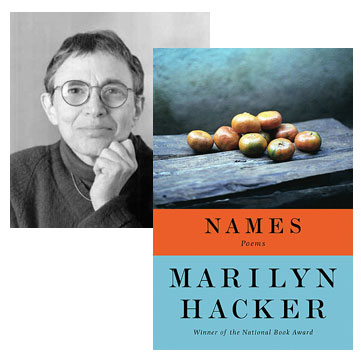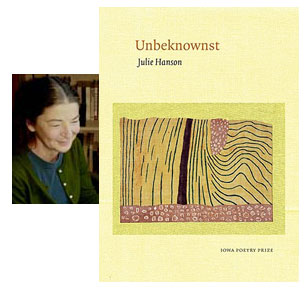Marilyn Hacker, “Ghazal: Myself”

They say the rules are: be forgotten, or proclaim myself.
I’m reasonably tired of that game, myself.I watched some friends rush off, called by the wild,
and stayed home to make coffee for the tame myself.There are actions I was pressured or seduced to,
but for omissions, I can only blame myself.Do I think that my averted glance
nullifies suffering? First of all, I maim myself.Did sex ever seem like work to you?
Sometimes, five minutes after I came myself.Although I’m manifestly “not my type”
the one in my bed this morning was, all the same, myself.Not Elektra, Clytemnestra, nor Iphigenia,
I’ll remain an unsung keeper of the flame myself.Burnished oak surrounds a rectangle of glass
at the top of the stairs, in which I frame myself.A signature hangs, unwritten, below the last
line on the page, where I’m obliged to name myself.
Names is the most recent collection from National Book Award winner Marilyn Hacker. The title poem appeared in The New Yorker; other poems in the collection include “Glose: Storm” and “Glose: Dumb heat, not snow, sheathes Paris in July” (published in Lodestar Quarterly), plus “Paragraphs for Hayden” (which she self-analyzed for How a Poem Happens).
“Myself” is one of several ghazals in Names, including “Style” (Poetry Northwest) and “Nothing.” The ghazal is a form of poetry emerging from Arabic traditions, usually dealing with love and separation; the second line of each couplet must end with the same word or words and, as you may have noticed, with the same rhyming scheme before that common ending. (The glose, as long as we’re here, is a form that begins by quoting a quatrain from a poem to whom one wishes to pay tribute; each of the glose’s four stanzas then incorporates one line of that quatrain.)
6 April 2011 | poetry |
Julie Hanson, “Cold Cereal and Milk at 3 A.M.”

What can make something so simple taste so good,
so indulgent? What have I done, and what have I not,
what have I said, what have I sent that comes back now,
willed or misapplied, in a boomerang of harm?This is a time of holding in the mouth, of chewing slowly
even these softened squares. The body is comforted by this
as it has been by the remembered scent of those I have loved
who are far and gone from me and dead. Brought close
with their completed lives, they seem to have known me wholly.Even this wheat-sweetened milk is delicious. And when one
sunken piece turns up—a surprise ending—its gray ghost
stirred and revealed, a small celebration takes place then,
under the ribbed ceiling, near the back of the gums.
Julie Hanson’s Unbeknownst is a winner of the 2010 Iowa Poetry Prize. (Yesterday, we featured the other winner, L.S. Klatt’s Cloud of Ink.) The collection also includes “Allocation” (published in Terrain.org) and “Remedial Weeding” (originally published in The Cincinnati Review).
Of Unbeknownst, University of Iowa Press editor Holly Carver has said, “I’ve been working with these Poetry Prize books for 20-some years, and to my mind, her [manuscript] was one of the freshest and brightest books that we’ve ever published. It just seemed to have an honesty and an accessibility that made it really stand above a lot of other really good, cleverly crafted poems that maybe didn’t ring quite as true.”
5 April 2011 | poetry |

 Our Endless and Proper Work is my new book with Belt Publishing about starting (and sticking to) a productive writing practice.
Our Endless and Proper Work is my new book with Belt Publishing about starting (and sticking to) a productive writing practice. 
